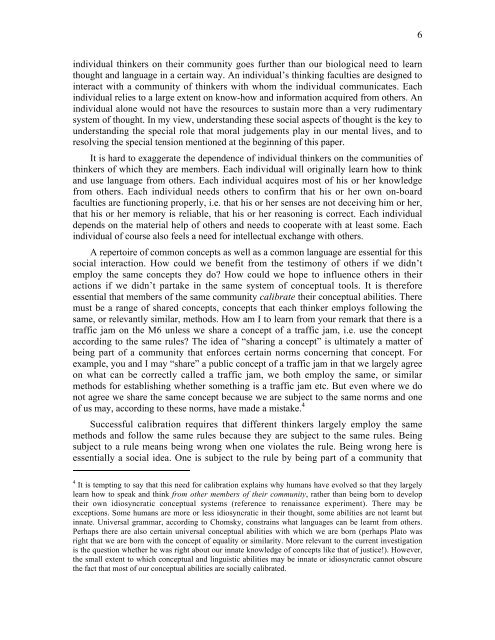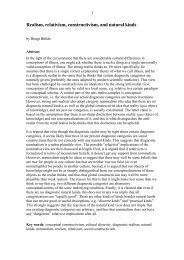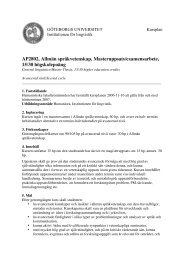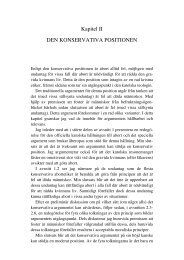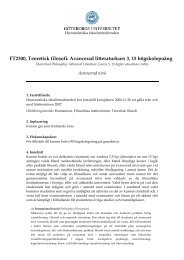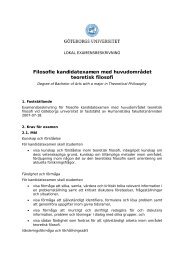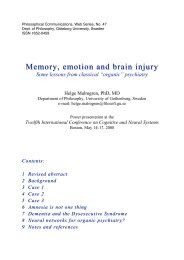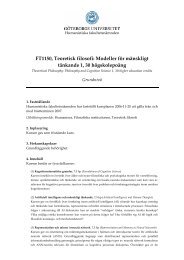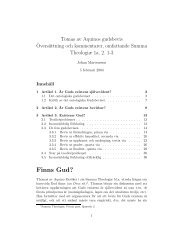Moral Relativism
Moral Relativism
Moral Relativism
- No tags were found...
Create successful ePaper yourself
Turn your PDF publications into a flip-book with our unique Google optimized e-Paper software.
6individual thinkers on their community goes further than our biological need to learnthought and language in a certain way. An individual’s thinking faculties are designed tointeract with a community of thinkers with whom the individual communicates. Eachindividual relies to a large extent on know-how and information acquired from others. Anindividual alone would not have the resources to sustain more than a very rudimentarysystem of thought. In my view, understanding these social aspects of thought is the key tounderstanding the special role that moral judgements play in our mental lives, and toresolving the special tension mentioned at the beginning of this paper.It is hard to exaggerate the dependence of individual thinkers on the communities ofthinkers of which they are members. Each individual will originally learn how to thinkand use language from others. Each individual acquires most of his or her knowledgefrom others. Each individual needs others to confirm that his or her own on-boardfaculties are functioning properly, i.e. that his or her senses are not deceiving him or her,that his or her memory is reliable, that his or her reasoning is correct. Each individualdepends on the material help of others and needs to cooperate with at least some. Eachindividual of course also feels a need for intellectual exchange with others.A repertoire of common concepts as well as a common language are essential for thissocial interaction. How could we benefit from the testimony of others if we didn’temploy the same concepts they do? How could we hope to influence others in theiractions if we didn’t partake in the same system of conceptual tools. It is thereforeessential that members of the same community calibrate their conceptual abilities. Theremust be a range of shared concepts, concepts that each thinker employs following thesame, or relevantly similar, methods. How am I to learn from your remark that there is atraffic jam on the M6 unless we share a concept of a traffic jam, i.e. use the conceptaccording to the same rules? The idea of “sharing a concept” is ultimately a matter ofbeing part of a community that enforces certain norms concerning that concept. Forexample, you and I may “share” a public concept of a traffic jam in that we largely agreeon what can be correctly called a traffic jam, we both employ the same, or similarmethods for establishing whether something is a traffic jam etc. But even where we donot agree we share the same concept because we are subject to the same norms and oneof us may, according to these norms, have made a mistake. 4Successful calibration requires that different thinkers largely employ the samemethods and follow the same rules because they are subject to the same rules. Beingsubject to a rule means being wrong when one violates the rule. Being wrong here isessentially a social idea. One is subject to the rule by being part of a community that4 It is tempting to say that this need for calibration explains why humans have evolved so that they largelylearn how to speak and think from other members of their community, rather than being born to developtheir own idiosyncratic conceptual systems (reference to renaissance experiment). There may beexceptions. Some humans are more or less idiosyncratic in their thought, some abilities are not learnt butinnate. Universal grammar, according to Chomsky, constrains what languages can be learnt from others.Perhaps there are also certain universal conceptual abilities with which we are born (perhaps Plato wasright that we are born with the concept of equality or similarity. More relevant to the current investigationis the question whether he was right about our innate knowledge of concepts like that of justice!). However,the small extent to which conceptual and linguistic abilities may be innate or idiosyncratic cannot obscurethe fact that most of our conceptual abilities are socially calibrated.


